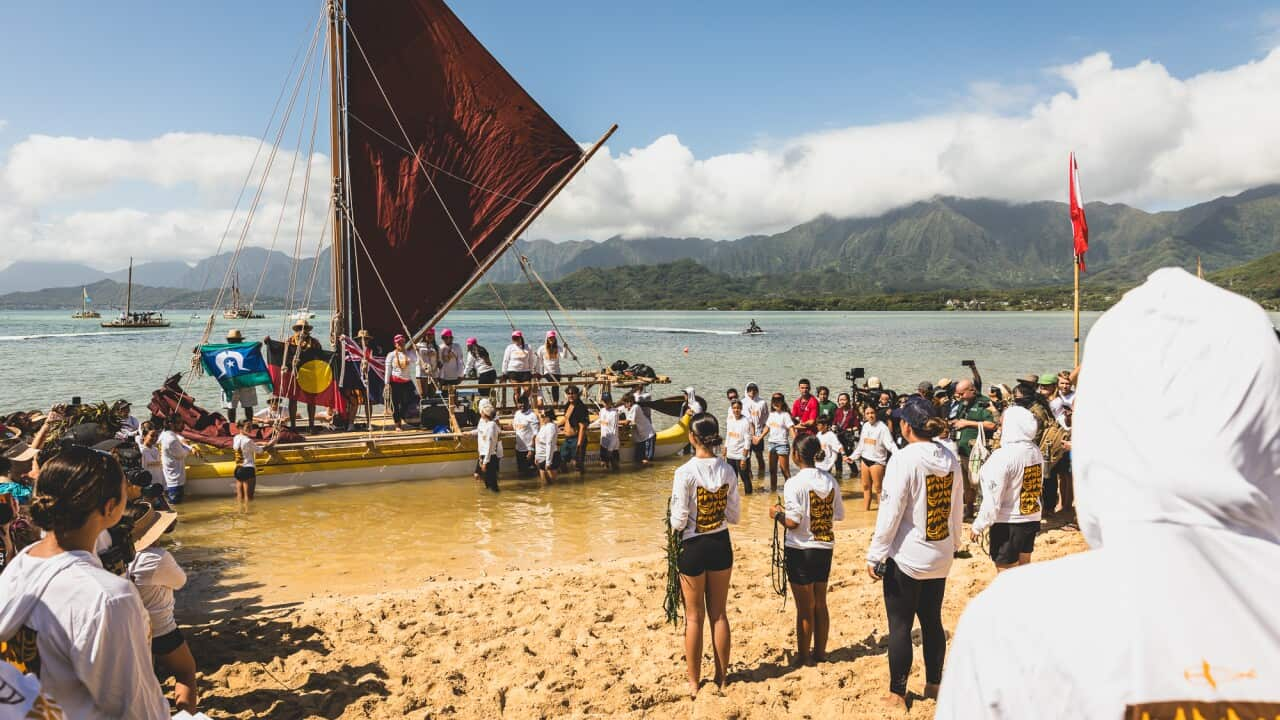As remote Indigenous communities across the country grapple with high rates of poor health, housing, food security, water security and aging infrastructure, Torres Strait Islanders say there’s something much worse lapping at their doorstep.
The Torres Strait and Northern Peninsula Area are revered for their pristine waters and unique landscapes.
Home to two of the world’s oldest living cultures, the region's leaders are calling on those campaigning to run the country to invest in their communities and help protect them from climate change.
The Chair of the region's federal body, George Nona, says climate change filters into everything, exacerbating all other issues the region faces.
“Climate change is affecting the high water, the infrastructure, the employment and also tapping into education,” he told NITV.
“We have kids growing up and [we want to make sure] they will have something when they come out of school.”
A month out from the May election, the federal Labor government announced $77.4 million in funding for seawalls and critical water supply infrastructure.
Ned David, chair of the region's Native Title Body Gur A Baradharaw Kod (GBK), said the investment would enhance climate resilience in the region by safeguarding homes, infrastructure, cultural sites, and livelihoods.
“While seawalls are not the only solution, they are a vital line of defence for our low-lying communities facing rising seas,” he said.
But the Queensland state government hasn't responded to calls from the community to support the projects, which require co-investment.

A Boigu street after rain. The risk of infection from dirty water has increased because of the water that has started pooling after rainfall and flooding.
Queensland’s Minister for Water, Ann Leahy, would not respond directly to questions about whether the government would support the projects.
“The Crisafulli Government is committed to delivering generational water infrastructure throughout Queensland, including providing safe, reliable, water infrastructure for Aboriginal and Torres Strait Islander communities,” she said.
Calls to tackle climate change's root causes
But some are calling on the government to look at the bigger picture, at what more can be done to stop climate change.
On Saibai, one of the most northerly and low-lying islands of the Torres Strait, seawalls were built in 2017 and were meant to ensure climate resilience for 50 years.
Saibai Traditional Owner, Uncle Paul Kabai, said it only took four years for water to rise above the level of the seawall.
Stream free On Demand

The Voice and Climate Change
episode • The Point • Current Affairs • 54m
episode • The Point • Current Affairs • 54m
He says the water is now also bubbling up from under the wall.
“It shows the world and the people out there how we are affected by this rising sea levels, how quickly Saibai is sinking,” he said
“We need government to focus on ... how they can stop gas emissions, or reduce it.
“We [also] have unpredictable weather and heavy rains in the region, it’s not like before.”
Federal Indigenous Affairs minister McCarthy said her government remained focused on renewable energy and the governments 2024 Net Zero Plan, to join efforts to reduce gas emissions as per the Paris Agreement.
The Coalition did not respond to questions from NITV about their plans for climate change mitigation.
Global warming affecting the region's health
As sea levels rise, so do frustrations in the region, particularly in the health sector.
Francis Nona, a Saibai Island man with strong ties to Badu Island, is a researcher at Queensland University of Technology (QUT) Carumba Institute in Brisbane with a focus on the effects of climate change on health.
He says high rates of preventable deaths in the region, should be a good reason to pay attention to climate change.
“It's important that we take this seriously, as climate change is exacerbating our poor health,” he said.
The region has been subject to a number of reports and investigations into health, which show Torres Strait Islanders are disadvantaged compared to the general population.
“We need community-led health planning, environmental health monitoring and recognition that living on country it itself supports well-being and resilience,” said Mr Nona.
“Early intervention is key to controlling, climate sensitive diseases.”
Mer Island man, Professor Sean Taylor, is the Director at the regions only Community Controlled Health organisation based in the Torres Strait, Torres Health.
He says governments need to focus on the social determinants of health like housing, food security, preventative health and the shift to community-controlled health services.
“Over the many years, [we’ve] constantly [spoken] about chronic disease and we're seeing a significant increase in death,” he said.
He urged governments to prioritise their commitments to transition health services to community-controlled health.
“We need to start to take action and have the funds to be able to move forward, because we can't constantly repeat ourselves,” he said.





